Commercial Law 7 Assignment: Contractual Terms, Remedies and Breach
VerifiedAdded on 2021/06/15
|11
|3077
|195
Case Study
AI Summary
This commercial law assignment analyzes a case involving an oral assurance made during contract formation. The case explores whether the assurance constitutes a contractual term and, if so, whether it is a condition or a warranty. The analysis delves into the essential elements of a contract, including offer, acceptance, intention, consideration, and capacity. It examines the distinction between conditions and warranties and their implications in case of a breach. The assignment then investigates the remedies available to the aggrieved party, including damages, rescission, specific performance, injunctions, and repudiation. The student provides a detailed legal analysis, applying relevant case law and principles to determine the legal outcomes and potential remedies in the given scenario.
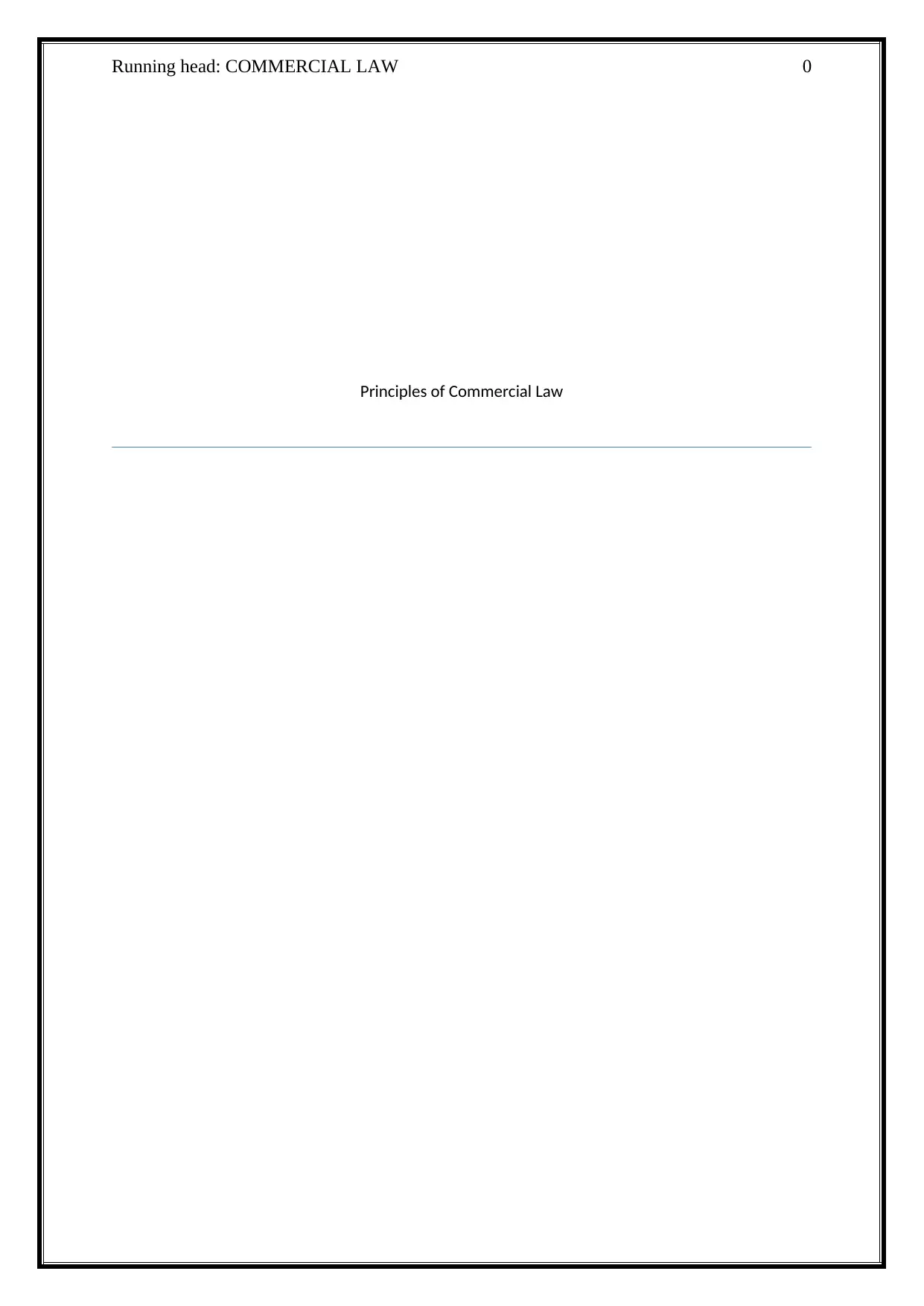
Running head: COMMERCIAL LAW 0
Principles of Commercial Law
Principles of Commercial Law
Paraphrase This Document
Need a fresh take? Get an instant paraphrase of this document with our AI Paraphraser
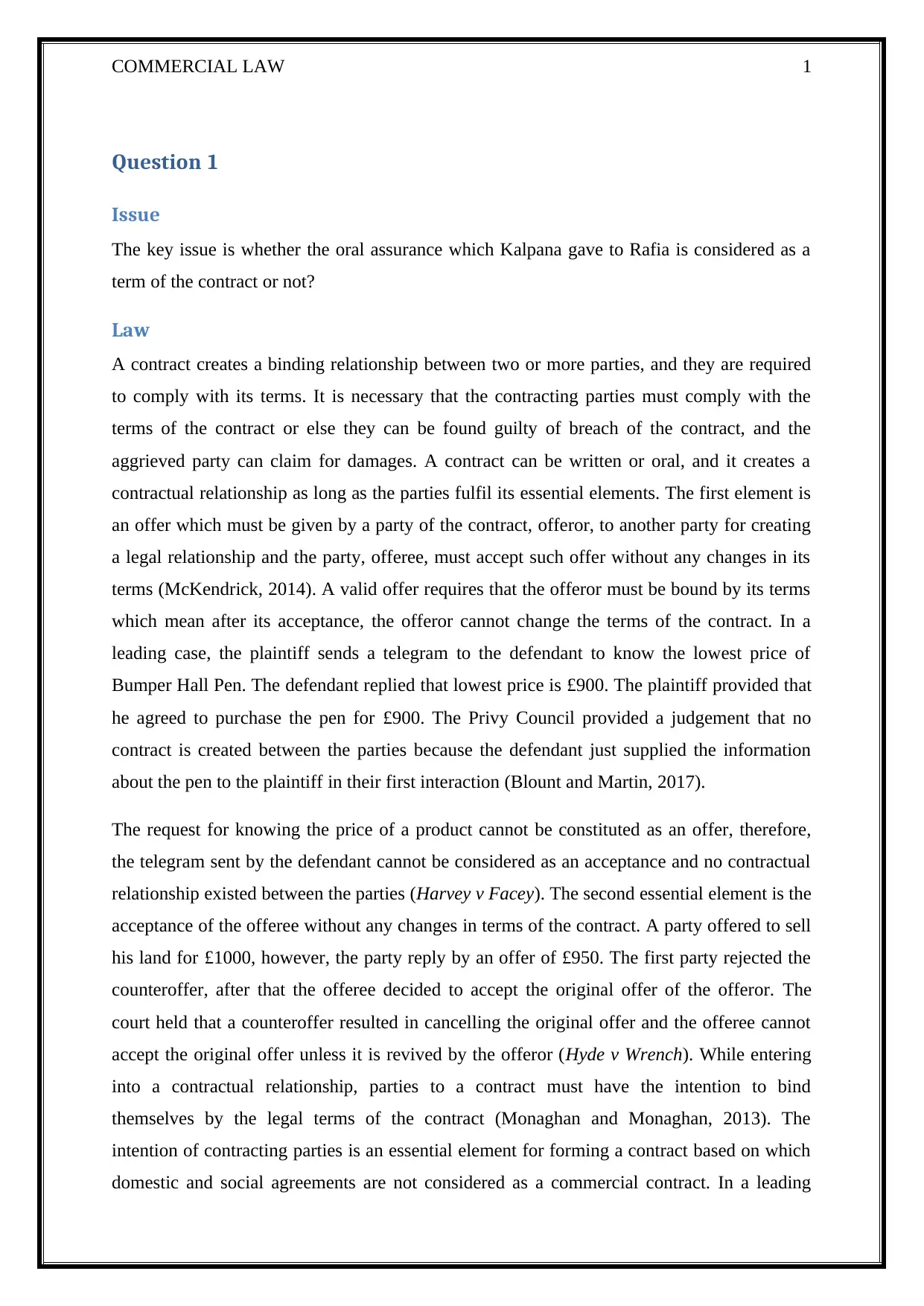
COMMERCIAL LAW 1
Question 1
Issue
The key issue is whether the oral assurance which Kalpana gave to Rafia is considered as a
term of the contract or not?
Law
A contract creates a binding relationship between two or more parties, and they are required
to comply with its terms. It is necessary that the contracting parties must comply with the
terms of the contract or else they can be found guilty of breach of the contract, and the
aggrieved party can claim for damages. A contract can be written or oral, and it creates a
contractual relationship as long as the parties fulfil its essential elements. The first element is
an offer which must be given by a party of the contract, offeror, to another party for creating
a legal relationship and the party, offeree, must accept such offer without any changes in its
terms (McKendrick, 2014). A valid offer requires that the offeror must be bound by its terms
which mean after its acceptance, the offeror cannot change the terms of the contract. In a
leading case, the plaintiff sends a telegram to the defendant to know the lowest price of
Bumper Hall Pen. The defendant replied that lowest price is £900. The plaintiff provided that
he agreed to purchase the pen for £900. The Privy Council provided a judgement that no
contract is created between the parties because the defendant just supplied the information
about the pen to the plaintiff in their first interaction (Blount and Martin, 2017).
The request for knowing the price of a product cannot be constituted as an offer, therefore,
the telegram sent by the defendant cannot be considered as an acceptance and no contractual
relationship existed between the parties (Harvey v Facey). The second essential element is the
acceptance of the offeree without any changes in terms of the contract. A party offered to sell
his land for £1000, however, the party reply by an offer of £950. The first party rejected the
counteroffer, after that the offeree decided to accept the original offer of the offeror. The
court held that a counteroffer resulted in cancelling the original offer and the offeree cannot
accept the original offer unless it is revived by the offeror (Hyde v Wrench). While entering
into a contractual relationship, parties to a contract must have the intention to bind
themselves by the legal terms of the contract (Monaghan and Monaghan, 2013). The
intention of contracting parties is an essential element for forming a contract based on which
domestic and social agreements are not considered as a commercial contract. In a leading
Question 1
Issue
The key issue is whether the oral assurance which Kalpana gave to Rafia is considered as a
term of the contract or not?
Law
A contract creates a binding relationship between two or more parties, and they are required
to comply with its terms. It is necessary that the contracting parties must comply with the
terms of the contract or else they can be found guilty of breach of the contract, and the
aggrieved party can claim for damages. A contract can be written or oral, and it creates a
contractual relationship as long as the parties fulfil its essential elements. The first element is
an offer which must be given by a party of the contract, offeror, to another party for creating
a legal relationship and the party, offeree, must accept such offer without any changes in its
terms (McKendrick, 2014). A valid offer requires that the offeror must be bound by its terms
which mean after its acceptance, the offeror cannot change the terms of the contract. In a
leading case, the plaintiff sends a telegram to the defendant to know the lowest price of
Bumper Hall Pen. The defendant replied that lowest price is £900. The plaintiff provided that
he agreed to purchase the pen for £900. The Privy Council provided a judgement that no
contract is created between the parties because the defendant just supplied the information
about the pen to the plaintiff in their first interaction (Blount and Martin, 2017).
The request for knowing the price of a product cannot be constituted as an offer, therefore,
the telegram sent by the defendant cannot be considered as an acceptance and no contractual
relationship existed between the parties (Harvey v Facey). The second essential element is the
acceptance of the offeree without any changes in terms of the contract. A party offered to sell
his land for £1000, however, the party reply by an offer of £950. The first party rejected the
counteroffer, after that the offeree decided to accept the original offer of the offeror. The
court held that a counteroffer resulted in cancelling the original offer and the offeree cannot
accept the original offer unless it is revived by the offeror (Hyde v Wrench). While entering
into a contractual relationship, parties to a contract must have the intention to bind
themselves by the legal terms of the contract (Monaghan and Monaghan, 2013). The
intention of contracting parties is an essential element for forming a contract based on which
domestic and social agreements are not considered as a commercial contract. In a leading
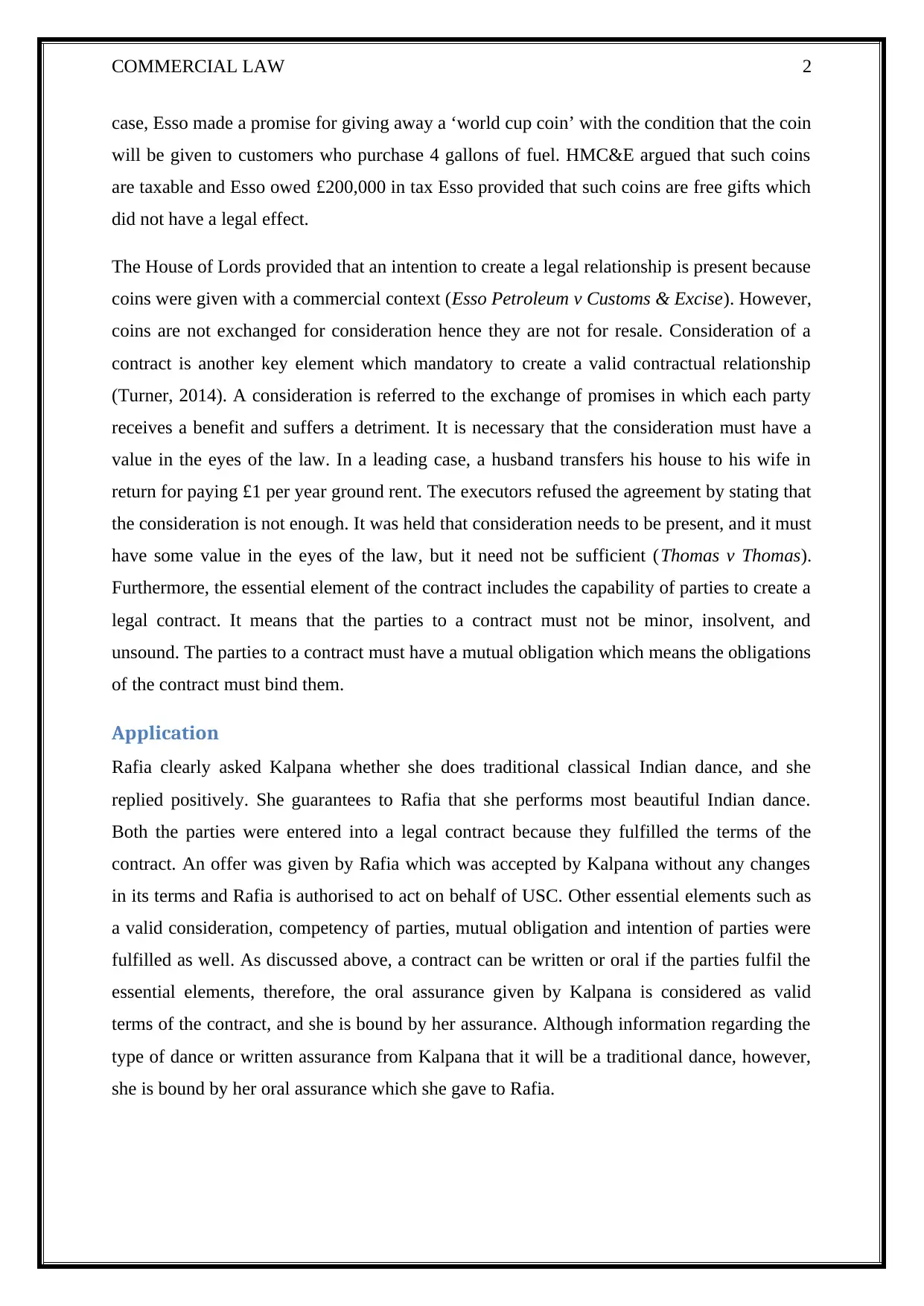
COMMERCIAL LAW 2
case, Esso made a promise for giving away a ‘world cup coin’ with the condition that the coin
will be given to customers who purchase 4 gallons of fuel. HMC&E argued that such coins
are taxable and Esso owed £200,000 in tax Esso provided that such coins are free gifts which
did not have a legal effect.
The House of Lords provided that an intention to create a legal relationship is present because
coins were given with a commercial context (Esso Petroleum v Customs & Excise). However,
coins are not exchanged for consideration hence they are not for resale. Consideration of a
contract is another key element which mandatory to create a valid contractual relationship
(Turner, 2014). A consideration is referred to the exchange of promises in which each party
receives a benefit and suffers a detriment. It is necessary that the consideration must have a
value in the eyes of the law. In a leading case, a husband transfers his house to his wife in
return for paying £1 per year ground rent. The executors refused the agreement by stating that
the consideration is not enough. It was held that consideration needs to be present, and it must
have some value in the eyes of the law, but it need not be sufficient (Thomas v Thomas).
Furthermore, the essential element of the contract includes the capability of parties to create a
legal contract. It means that the parties to a contract must not be minor, insolvent, and
unsound. The parties to a contract must have a mutual obligation which means the obligations
of the contract must bind them.
Application
Rafia clearly asked Kalpana whether she does traditional classical Indian dance, and she
replied positively. She guarantees to Rafia that she performs most beautiful Indian dance.
Both the parties were entered into a legal contract because they fulfilled the terms of the
contract. An offer was given by Rafia which was accepted by Kalpana without any changes
in its terms and Rafia is authorised to act on behalf of USC. Other essential elements such as
a valid consideration, competency of parties, mutual obligation and intention of parties were
fulfilled as well. As discussed above, a contract can be written or oral if the parties fulfil the
essential elements, therefore, the oral assurance given by Kalpana is considered as valid
terms of the contract, and she is bound by her assurance. Although information regarding the
type of dance or written assurance from Kalpana that it will be a traditional dance, however,
she is bound by her oral assurance which she gave to Rafia.
case, Esso made a promise for giving away a ‘world cup coin’ with the condition that the coin
will be given to customers who purchase 4 gallons of fuel. HMC&E argued that such coins
are taxable and Esso owed £200,000 in tax Esso provided that such coins are free gifts which
did not have a legal effect.
The House of Lords provided that an intention to create a legal relationship is present because
coins were given with a commercial context (Esso Petroleum v Customs & Excise). However,
coins are not exchanged for consideration hence they are not for resale. Consideration of a
contract is another key element which mandatory to create a valid contractual relationship
(Turner, 2014). A consideration is referred to the exchange of promises in which each party
receives a benefit and suffers a detriment. It is necessary that the consideration must have a
value in the eyes of the law. In a leading case, a husband transfers his house to his wife in
return for paying £1 per year ground rent. The executors refused the agreement by stating that
the consideration is not enough. It was held that consideration needs to be present, and it must
have some value in the eyes of the law, but it need not be sufficient (Thomas v Thomas).
Furthermore, the essential element of the contract includes the capability of parties to create a
legal contract. It means that the parties to a contract must not be minor, insolvent, and
unsound. The parties to a contract must have a mutual obligation which means the obligations
of the contract must bind them.
Application
Rafia clearly asked Kalpana whether she does traditional classical Indian dance, and she
replied positively. She guarantees to Rafia that she performs most beautiful Indian dance.
Both the parties were entered into a legal contract because they fulfilled the terms of the
contract. An offer was given by Rafia which was accepted by Kalpana without any changes
in its terms and Rafia is authorised to act on behalf of USC. Other essential elements such as
a valid consideration, competency of parties, mutual obligation and intention of parties were
fulfilled as well. As discussed above, a contract can be written or oral if the parties fulfil the
essential elements, therefore, the oral assurance given by Kalpana is considered as valid
terms of the contract, and she is bound by her assurance. Although information regarding the
type of dance or written assurance from Kalpana that it will be a traditional dance, however,
she is bound by her oral assurance which she gave to Rafia.
⊘ This is a preview!⊘
Do you want full access?
Subscribe today to unlock all pages.

Trusted by 1+ million students worldwide

COMMERCIAL LAW 3
Conclusion
Thus, Kalpana is bound by her oral assurance which she gave to Rafia, and it is considered as
a term of the contract.
Conclusion
Thus, Kalpana is bound by her oral assurance which she gave to Rafia, and it is considered as
a term of the contract.
Paraphrase This Document
Need a fresh take? Get an instant paraphrase of this document with our AI Paraphraser
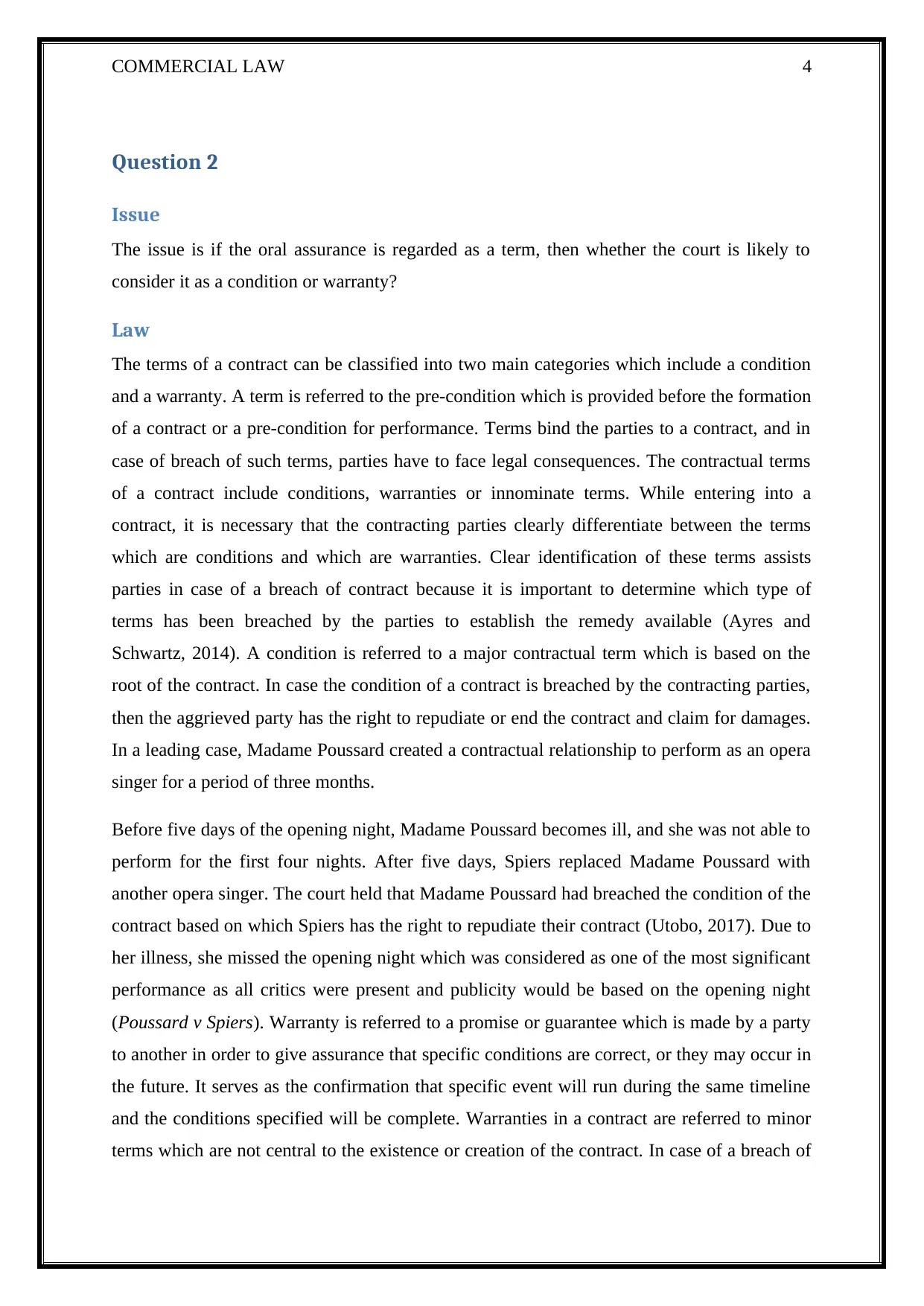
COMMERCIAL LAW 4
Question 2
Issue
The issue is if the oral assurance is regarded as a term, then whether the court is likely to
consider it as a condition or warranty?
Law
The terms of a contract can be classified into two main categories which include a condition
and a warranty. A term is referred to the pre-condition which is provided before the formation
of a contract or a pre-condition for performance. Terms bind the parties to a contract, and in
case of breach of such terms, parties have to face legal consequences. The contractual terms
of a contract include conditions, warranties or innominate terms. While entering into a
contract, it is necessary that the contracting parties clearly differentiate between the terms
which are conditions and which are warranties. Clear identification of these terms assists
parties in case of a breach of contract because it is important to determine which type of
terms has been breached by the parties to establish the remedy available (Ayres and
Schwartz, 2014). A condition is referred to a major contractual term which is based on the
root of the contract. In case the condition of a contract is breached by the contracting parties,
then the aggrieved party has the right to repudiate or end the contract and claim for damages.
In a leading case, Madame Poussard created a contractual relationship to perform as an opera
singer for a period of three months.
Before five days of the opening night, Madame Poussard becomes ill, and she was not able to
perform for the first four nights. After five days, Spiers replaced Madame Poussard with
another opera singer. The court held that Madame Poussard had breached the condition of the
contract based on which Spiers has the right to repudiate their contract (Utobo, 2017). Due to
her illness, she missed the opening night which was considered as one of the most significant
performance as all critics were present and publicity would be based on the opening night
(Poussard v Spiers). Warranty is referred to a promise or guarantee which is made by a party
to another in order to give assurance that specific conditions are correct, or they may occur in
the future. It serves as the confirmation that specific event will run during the same timeline
and the conditions specified will be complete. Warranties in a contract are referred to minor
terms which are not central to the existence or creation of the contract. In case of a breach of
Question 2
Issue
The issue is if the oral assurance is regarded as a term, then whether the court is likely to
consider it as a condition or warranty?
Law
The terms of a contract can be classified into two main categories which include a condition
and a warranty. A term is referred to the pre-condition which is provided before the formation
of a contract or a pre-condition for performance. Terms bind the parties to a contract, and in
case of breach of such terms, parties have to face legal consequences. The contractual terms
of a contract include conditions, warranties or innominate terms. While entering into a
contract, it is necessary that the contracting parties clearly differentiate between the terms
which are conditions and which are warranties. Clear identification of these terms assists
parties in case of a breach of contract because it is important to determine which type of
terms has been breached by the parties to establish the remedy available (Ayres and
Schwartz, 2014). A condition is referred to a major contractual term which is based on the
root of the contract. In case the condition of a contract is breached by the contracting parties,
then the aggrieved party has the right to repudiate or end the contract and claim for damages.
In a leading case, Madame Poussard created a contractual relationship to perform as an opera
singer for a period of three months.
Before five days of the opening night, Madame Poussard becomes ill, and she was not able to
perform for the first four nights. After five days, Spiers replaced Madame Poussard with
another opera singer. The court held that Madame Poussard had breached the condition of the
contract based on which Spiers has the right to repudiate their contract (Utobo, 2017). Due to
her illness, she missed the opening night which was considered as one of the most significant
performance as all critics were present and publicity would be based on the opening night
(Poussard v Spiers). Warranty is referred to a promise or guarantee which is made by a party
to another in order to give assurance that specific conditions are correct, or they may occur in
the future. It serves as the confirmation that specific event will run during the same timeline
and the conditions specified will be complete. Warranties in a contract are referred to minor
terms which are not central to the existence or creation of the contract. In case of a breach of
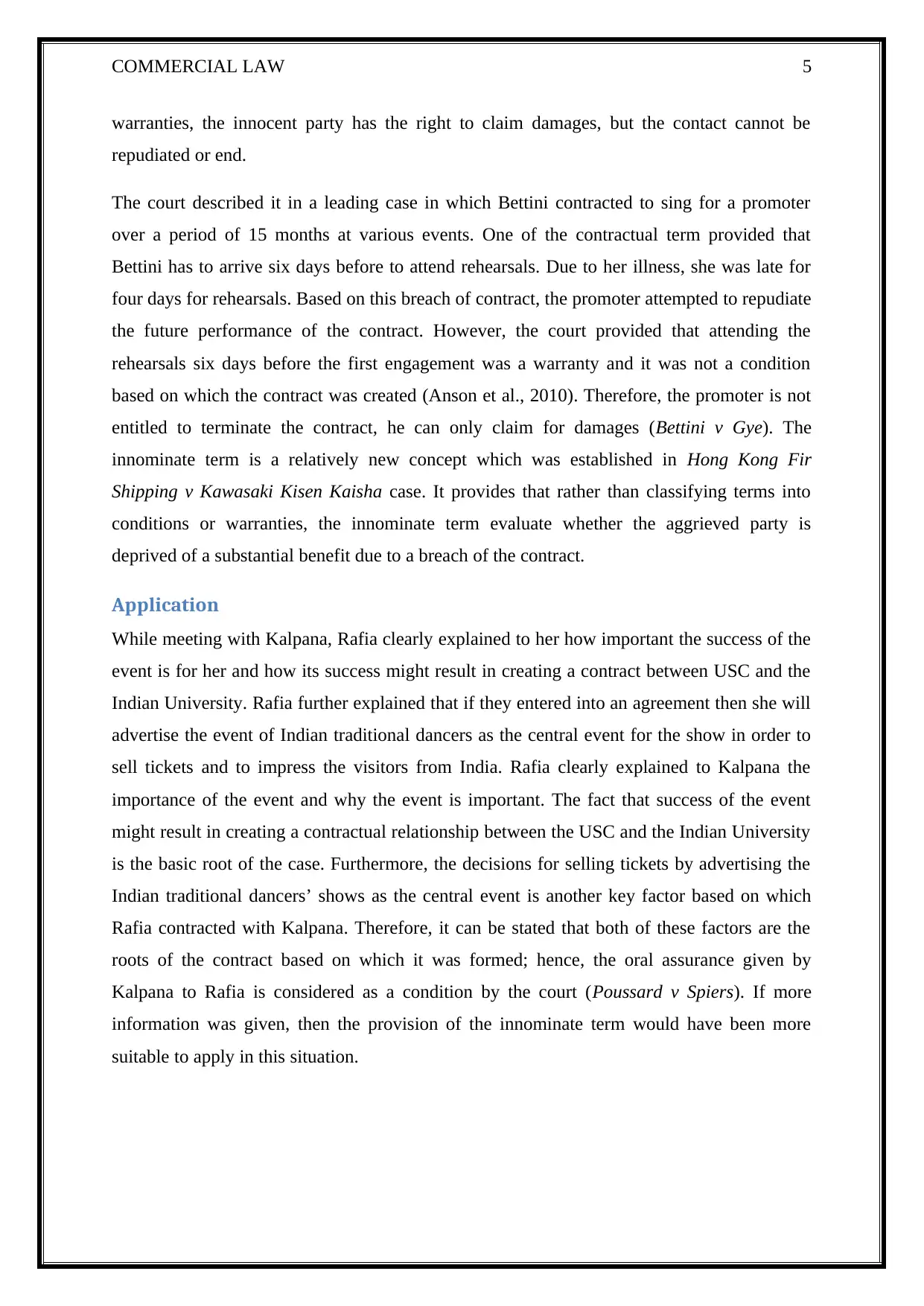
COMMERCIAL LAW 5
warranties, the innocent party has the right to claim damages, but the contact cannot be
repudiated or end.
The court described it in a leading case in which Bettini contracted to sing for a promoter
over a period of 15 months at various events. One of the contractual term provided that
Bettini has to arrive six days before to attend rehearsals. Due to her illness, she was late for
four days for rehearsals. Based on this breach of contract, the promoter attempted to repudiate
the future performance of the contract. However, the court provided that attending the
rehearsals six days before the first engagement was a warranty and it was not a condition
based on which the contract was created (Anson et al., 2010). Therefore, the promoter is not
entitled to terminate the contract, he can only claim for damages (Bettini v Gye). The
innominate term is a relatively new concept which was established in Hong Kong Fir
Shipping v Kawasaki Kisen Kaisha case. It provides that rather than classifying terms into
conditions or warranties, the innominate term evaluate whether the aggrieved party is
deprived of a substantial benefit due to a breach of the contract.
Application
While meeting with Kalpana, Rafia clearly explained to her how important the success of the
event is for her and how its success might result in creating a contract between USC and the
Indian University. Rafia further explained that if they entered into an agreement then she will
advertise the event of Indian traditional dancers as the central event for the show in order to
sell tickets and to impress the visitors from India. Rafia clearly explained to Kalpana the
importance of the event and why the event is important. The fact that success of the event
might result in creating a contractual relationship between the USC and the Indian University
is the basic root of the case. Furthermore, the decisions for selling tickets by advertising the
Indian traditional dancers’ shows as the central event is another key factor based on which
Rafia contracted with Kalpana. Therefore, it can be stated that both of these factors are the
roots of the contract based on which it was formed; hence, the oral assurance given by
Kalpana to Rafia is considered as a condition by the court (Poussard v Spiers). If more
information was given, then the provision of the innominate term would have been more
suitable to apply in this situation.
warranties, the innocent party has the right to claim damages, but the contact cannot be
repudiated or end.
The court described it in a leading case in which Bettini contracted to sing for a promoter
over a period of 15 months at various events. One of the contractual term provided that
Bettini has to arrive six days before to attend rehearsals. Due to her illness, she was late for
four days for rehearsals. Based on this breach of contract, the promoter attempted to repudiate
the future performance of the contract. However, the court provided that attending the
rehearsals six days before the first engagement was a warranty and it was not a condition
based on which the contract was created (Anson et al., 2010). Therefore, the promoter is not
entitled to terminate the contract, he can only claim for damages (Bettini v Gye). The
innominate term is a relatively new concept which was established in Hong Kong Fir
Shipping v Kawasaki Kisen Kaisha case. It provides that rather than classifying terms into
conditions or warranties, the innominate term evaluate whether the aggrieved party is
deprived of a substantial benefit due to a breach of the contract.
Application
While meeting with Kalpana, Rafia clearly explained to her how important the success of the
event is for her and how its success might result in creating a contract between USC and the
Indian University. Rafia further explained that if they entered into an agreement then she will
advertise the event of Indian traditional dancers as the central event for the show in order to
sell tickets and to impress the visitors from India. Rafia clearly explained to Kalpana the
importance of the event and why the event is important. The fact that success of the event
might result in creating a contractual relationship between the USC and the Indian University
is the basic root of the case. Furthermore, the decisions for selling tickets by advertising the
Indian traditional dancers’ shows as the central event is another key factor based on which
Rafia contracted with Kalpana. Therefore, it can be stated that both of these factors are the
roots of the contract based on which it was formed; hence, the oral assurance given by
Kalpana to Rafia is considered as a condition by the court (Poussard v Spiers). If more
information was given, then the provision of the innominate term would have been more
suitable to apply in this situation.
⊘ This is a preview!⊘
Do you want full access?
Subscribe today to unlock all pages.

Trusted by 1+ million students worldwide
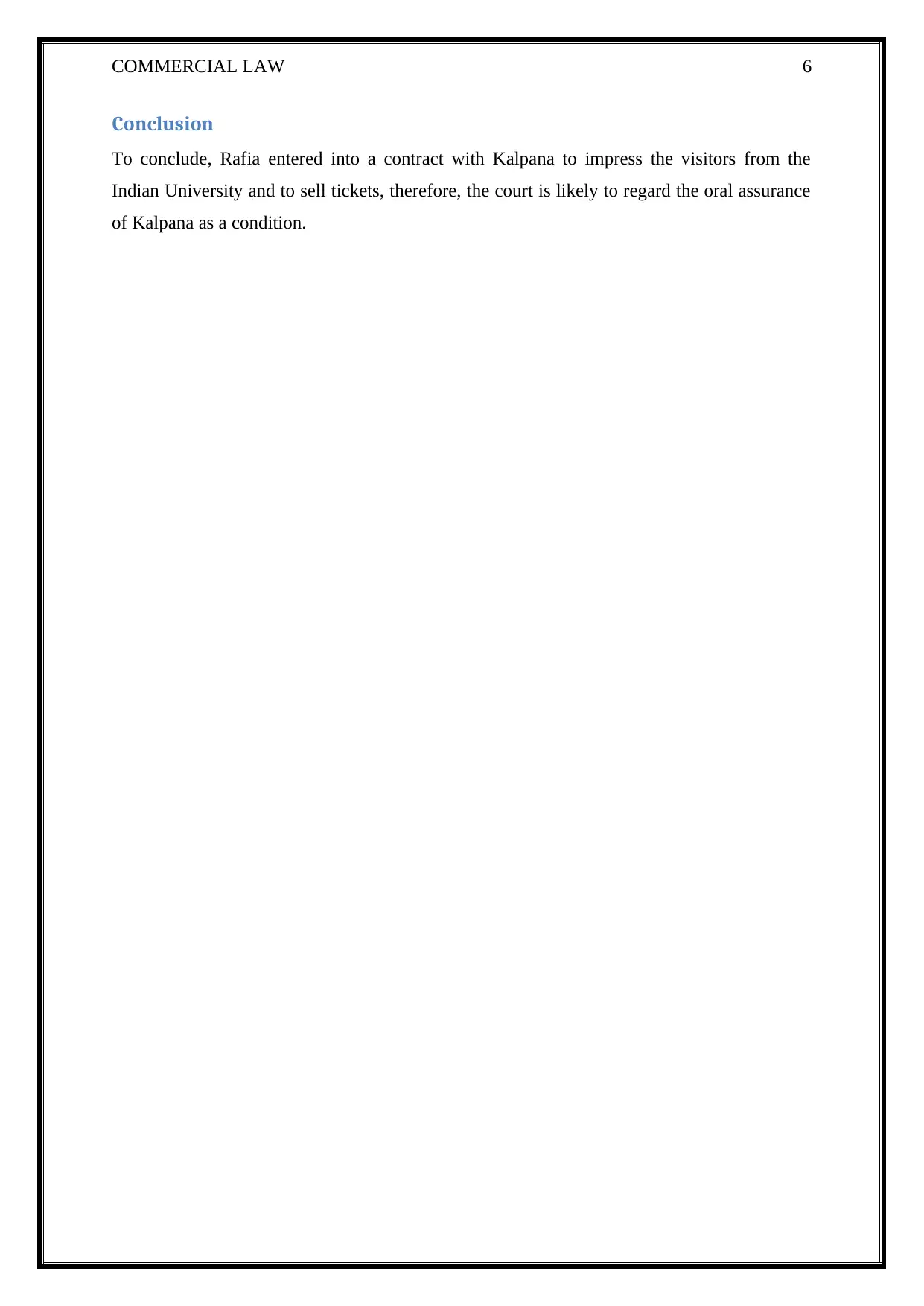
COMMERCIAL LAW 6
Conclusion
To conclude, Rafia entered into a contract with Kalpana to impress the visitors from the
Indian University and to sell tickets, therefore, the court is likely to regard the oral assurance
of Kalpana as a condition.
Conclusion
To conclude, Rafia entered into a contract with Kalpana to impress the visitors from the
Indian University and to sell tickets, therefore, the court is likely to regard the oral assurance
of Kalpana as a condition.
Paraphrase This Document
Need a fresh take? Get an instant paraphrase of this document with our AI Paraphraser
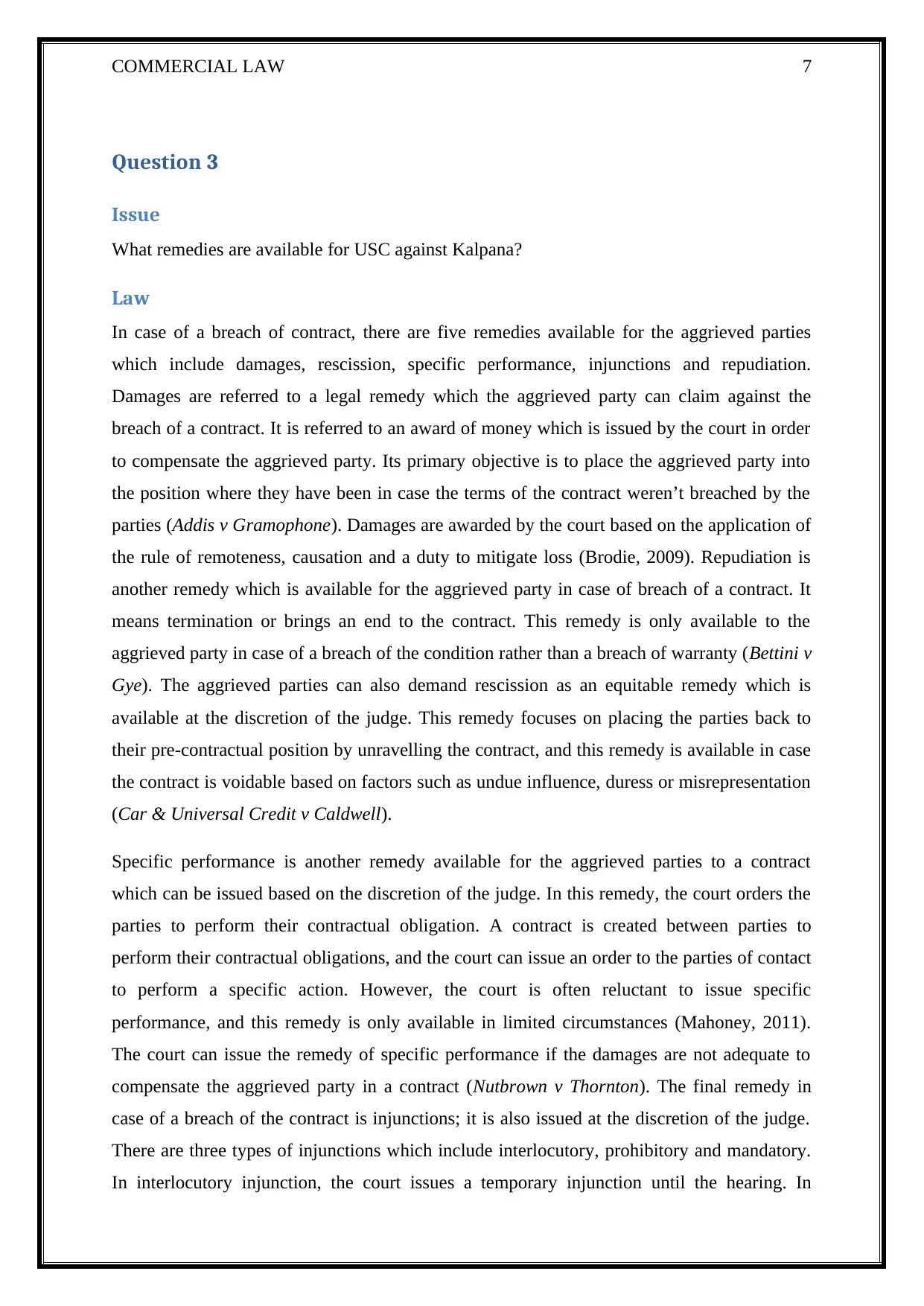
COMMERCIAL LAW 7
Question 3
Issue
What remedies are available for USC against Kalpana?
Law
In case of a breach of contract, there are five remedies available for the aggrieved parties
which include damages, rescission, specific performance, injunctions and repudiation.
Damages are referred to a legal remedy which the aggrieved party can claim against the
breach of a contract. It is referred to an award of money which is issued by the court in order
to compensate the aggrieved party. Its primary objective is to place the aggrieved party into
the position where they have been in case the terms of the contract weren’t breached by the
parties (Addis v Gramophone). Damages are awarded by the court based on the application of
the rule of remoteness, causation and a duty to mitigate loss (Brodie, 2009). Repudiation is
another remedy which is available for the aggrieved party in case of breach of a contract. It
means termination or brings an end to the contract. This remedy is only available to the
aggrieved party in case of a breach of the condition rather than a breach of warranty (Bettini v
Gye). The aggrieved parties can also demand rescission as an equitable remedy which is
available at the discretion of the judge. This remedy focuses on placing the parties back to
their pre-contractual position by unravelling the contract, and this remedy is available in case
the contract is voidable based on factors such as undue influence, duress or misrepresentation
(Car & Universal Credit v Caldwell).
Specific performance is another remedy available for the aggrieved parties to a contract
which can be issued based on the discretion of the judge. In this remedy, the court orders the
parties to perform their contractual obligation. A contract is created between parties to
perform their contractual obligations, and the court can issue an order to the parties of contact
to perform a specific action. However, the court is often reluctant to issue specific
performance, and this remedy is only available in limited circumstances (Mahoney, 2011).
The court can issue the remedy of specific performance if the damages are not adequate to
compensate the aggrieved party in a contract (Nutbrown v Thornton). The final remedy in
case of a breach of the contract is injunctions; it is also issued at the discretion of the judge.
There are three types of injunctions which include interlocutory, prohibitory and mandatory.
In interlocutory injunction, the court issues a temporary injunction until the hearing. In
Question 3
Issue
What remedies are available for USC against Kalpana?
Law
In case of a breach of contract, there are five remedies available for the aggrieved parties
which include damages, rescission, specific performance, injunctions and repudiation.
Damages are referred to a legal remedy which the aggrieved party can claim against the
breach of a contract. It is referred to an award of money which is issued by the court in order
to compensate the aggrieved party. Its primary objective is to place the aggrieved party into
the position where they have been in case the terms of the contract weren’t breached by the
parties (Addis v Gramophone). Damages are awarded by the court based on the application of
the rule of remoteness, causation and a duty to mitigate loss (Brodie, 2009). Repudiation is
another remedy which is available for the aggrieved party in case of breach of a contract. It
means termination or brings an end to the contract. This remedy is only available to the
aggrieved party in case of a breach of the condition rather than a breach of warranty (Bettini v
Gye). The aggrieved parties can also demand rescission as an equitable remedy which is
available at the discretion of the judge. This remedy focuses on placing the parties back to
their pre-contractual position by unravelling the contract, and this remedy is available in case
the contract is voidable based on factors such as undue influence, duress or misrepresentation
(Car & Universal Credit v Caldwell).
Specific performance is another remedy available for the aggrieved parties to a contract
which can be issued based on the discretion of the judge. In this remedy, the court orders the
parties to perform their contractual obligation. A contract is created between parties to
perform their contractual obligations, and the court can issue an order to the parties of contact
to perform a specific action. However, the court is often reluctant to issue specific
performance, and this remedy is only available in limited circumstances (Mahoney, 2011).
The court can issue the remedy of specific performance if the damages are not adequate to
compensate the aggrieved party in a contract (Nutbrown v Thornton). The final remedy in
case of a breach of the contract is injunctions; it is also issued at the discretion of the judge.
There are three types of injunctions which include interlocutory, prohibitory and mandatory.
In interlocutory injunction, the court issues a temporary injunction until the hearing. In
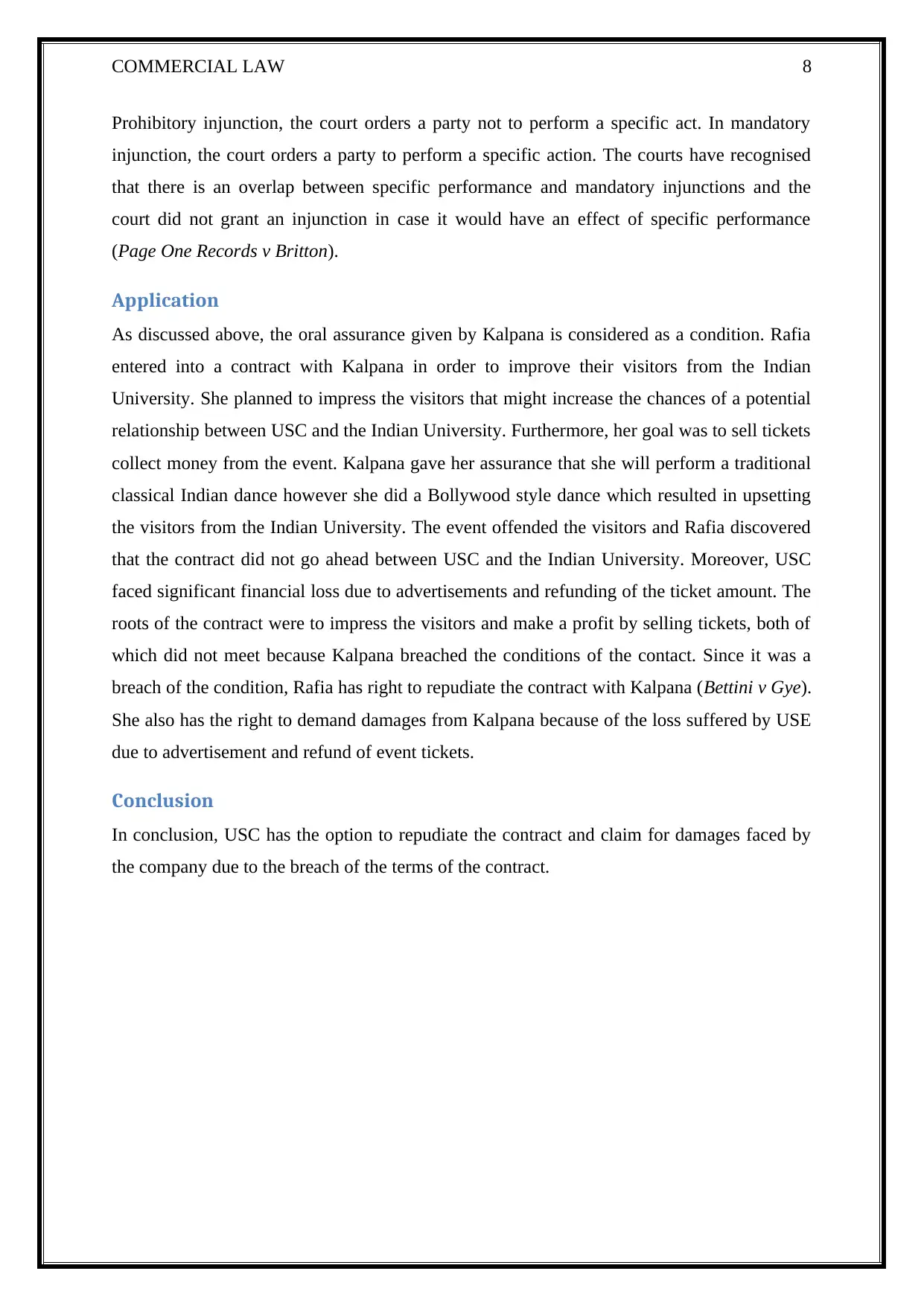
COMMERCIAL LAW 8
Prohibitory injunction, the court orders a party not to perform a specific act. In mandatory
injunction, the court orders a party to perform a specific action. The courts have recognised
that there is an overlap between specific performance and mandatory injunctions and the
court did not grant an injunction in case it would have an effect of specific performance
(Page One Records v Britton).
Application
As discussed above, the oral assurance given by Kalpana is considered as a condition. Rafia
entered into a contract with Kalpana in order to improve their visitors from the Indian
University. She planned to impress the visitors that might increase the chances of a potential
relationship between USC and the Indian University. Furthermore, her goal was to sell tickets
collect money from the event. Kalpana gave her assurance that she will perform a traditional
classical Indian dance however she did a Bollywood style dance which resulted in upsetting
the visitors from the Indian University. The event offended the visitors and Rafia discovered
that the contract did not go ahead between USC and the Indian University. Moreover, USC
faced significant financial loss due to advertisements and refunding of the ticket amount. The
roots of the contract were to impress the visitors and make a profit by selling tickets, both of
which did not meet because Kalpana breached the conditions of the contact. Since it was a
breach of the condition, Rafia has right to repudiate the contract with Kalpana (Bettini v Gye).
She also has the right to demand damages from Kalpana because of the loss suffered by USE
due to advertisement and refund of event tickets.
Conclusion
In conclusion, USC has the option to repudiate the contract and claim for damages faced by
the company due to the breach of the terms of the contract.
Prohibitory injunction, the court orders a party not to perform a specific act. In mandatory
injunction, the court orders a party to perform a specific action. The courts have recognised
that there is an overlap between specific performance and mandatory injunctions and the
court did not grant an injunction in case it would have an effect of specific performance
(Page One Records v Britton).
Application
As discussed above, the oral assurance given by Kalpana is considered as a condition. Rafia
entered into a contract with Kalpana in order to improve their visitors from the Indian
University. She planned to impress the visitors that might increase the chances of a potential
relationship between USC and the Indian University. Furthermore, her goal was to sell tickets
collect money from the event. Kalpana gave her assurance that she will perform a traditional
classical Indian dance however she did a Bollywood style dance which resulted in upsetting
the visitors from the Indian University. The event offended the visitors and Rafia discovered
that the contract did not go ahead between USC and the Indian University. Moreover, USC
faced significant financial loss due to advertisements and refunding of the ticket amount. The
roots of the contract were to impress the visitors and make a profit by selling tickets, both of
which did not meet because Kalpana breached the conditions of the contact. Since it was a
breach of the condition, Rafia has right to repudiate the contract with Kalpana (Bettini v Gye).
She also has the right to demand damages from Kalpana because of the loss suffered by USE
due to advertisement and refund of event tickets.
Conclusion
In conclusion, USC has the option to repudiate the contract and claim for damages faced by
the company due to the breach of the terms of the contract.
⊘ This is a preview!⊘
Do you want full access?
Subscribe today to unlock all pages.

Trusted by 1+ million students worldwide
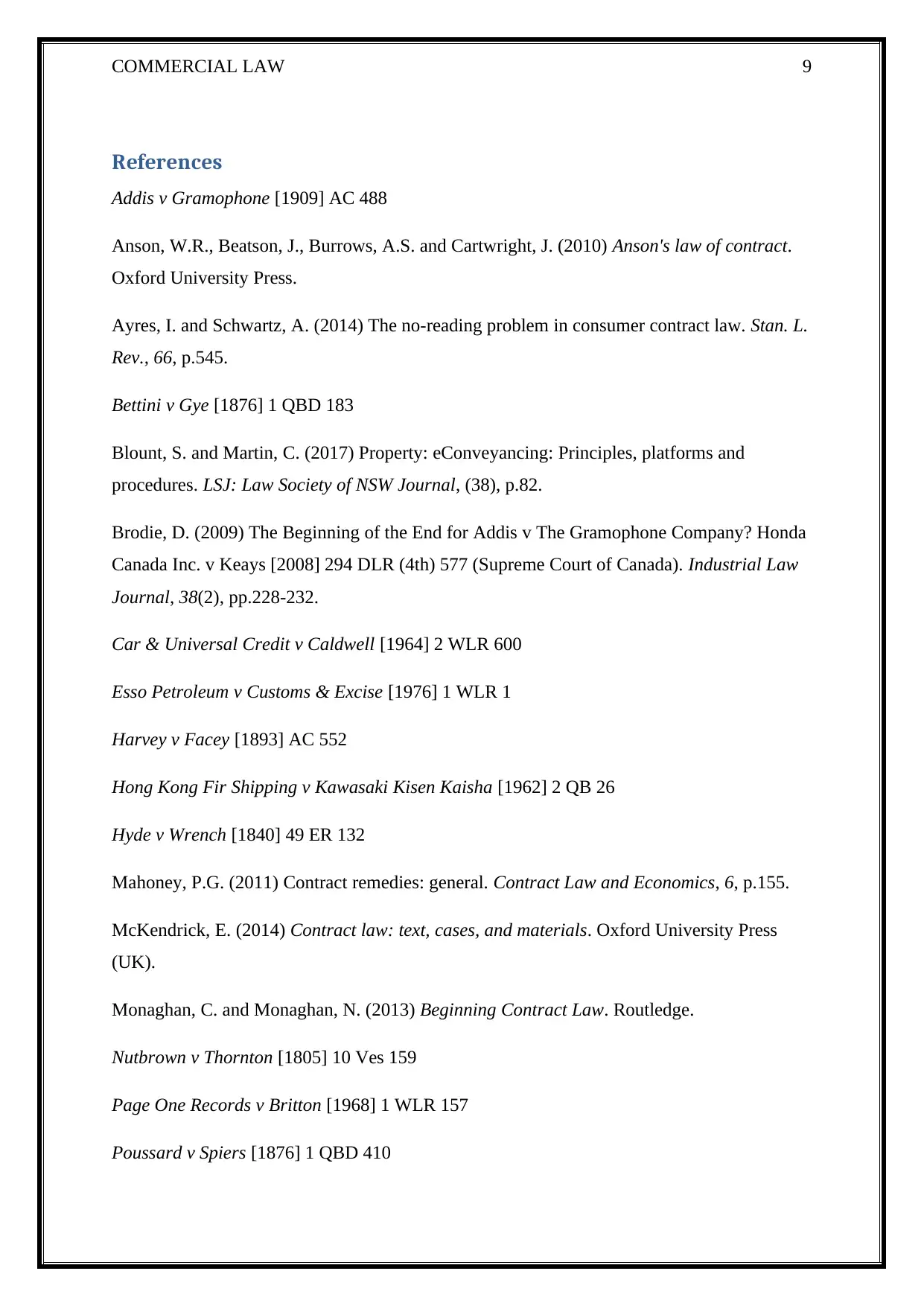
COMMERCIAL LAW 9
References
Addis v Gramophone [1909] AC 488
Anson, W.R., Beatson, J., Burrows, A.S. and Cartwright, J. (2010) Anson's law of contract.
Oxford University Press.
Ayres, I. and Schwartz, A. (2014) The no-reading problem in consumer contract law. Stan. L.
Rev., 66, p.545.
Bettini v Gye [1876] 1 QBD 183
Blount, S. and Martin, C. (2017) Property: eConveyancing: Principles, platforms and
procedures. LSJ: Law Society of NSW Journal, (38), p.82.
Brodie, D. (2009) The Beginning of the End for Addis v The Gramophone Company? Honda
Canada Inc. v Keays [2008] 294 DLR (4th) 577 (Supreme Court of Canada). Industrial Law
Journal, 38(2), pp.228-232.
Car & Universal Credit v Caldwell [1964] 2 WLR 600
Esso Petroleum v Customs & Excise [1976] 1 WLR 1
Harvey v Facey [1893] AC 552
Hong Kong Fir Shipping v Kawasaki Kisen Kaisha [1962] 2 QB 26
Hyde v Wrench [1840] 49 ER 132
Mahoney, P.G. (2011) Contract remedies: general. Contract Law and Economics, 6, p.155.
McKendrick, E. (2014) Contract law: text, cases, and materials. Oxford University Press
(UK).
Monaghan, C. and Monaghan, N. (2013) Beginning Contract Law. Routledge.
Nutbrown v Thornton [1805] 10 Ves 159
Page One Records v Britton [1968] 1 WLR 157
Poussard v Spiers [1876] 1 QBD 410
References
Addis v Gramophone [1909] AC 488
Anson, W.R., Beatson, J., Burrows, A.S. and Cartwright, J. (2010) Anson's law of contract.
Oxford University Press.
Ayres, I. and Schwartz, A. (2014) The no-reading problem in consumer contract law. Stan. L.
Rev., 66, p.545.
Bettini v Gye [1876] 1 QBD 183
Blount, S. and Martin, C. (2017) Property: eConveyancing: Principles, platforms and
procedures. LSJ: Law Society of NSW Journal, (38), p.82.
Brodie, D. (2009) The Beginning of the End for Addis v The Gramophone Company? Honda
Canada Inc. v Keays [2008] 294 DLR (4th) 577 (Supreme Court of Canada). Industrial Law
Journal, 38(2), pp.228-232.
Car & Universal Credit v Caldwell [1964] 2 WLR 600
Esso Petroleum v Customs & Excise [1976] 1 WLR 1
Harvey v Facey [1893] AC 552
Hong Kong Fir Shipping v Kawasaki Kisen Kaisha [1962] 2 QB 26
Hyde v Wrench [1840] 49 ER 132
Mahoney, P.G. (2011) Contract remedies: general. Contract Law and Economics, 6, p.155.
McKendrick, E. (2014) Contract law: text, cases, and materials. Oxford University Press
(UK).
Monaghan, C. and Monaghan, N. (2013) Beginning Contract Law. Routledge.
Nutbrown v Thornton [1805] 10 Ves 159
Page One Records v Britton [1968] 1 WLR 157
Poussard v Spiers [1876] 1 QBD 410
Paraphrase This Document
Need a fresh take? Get an instant paraphrase of this document with our AI Paraphraser
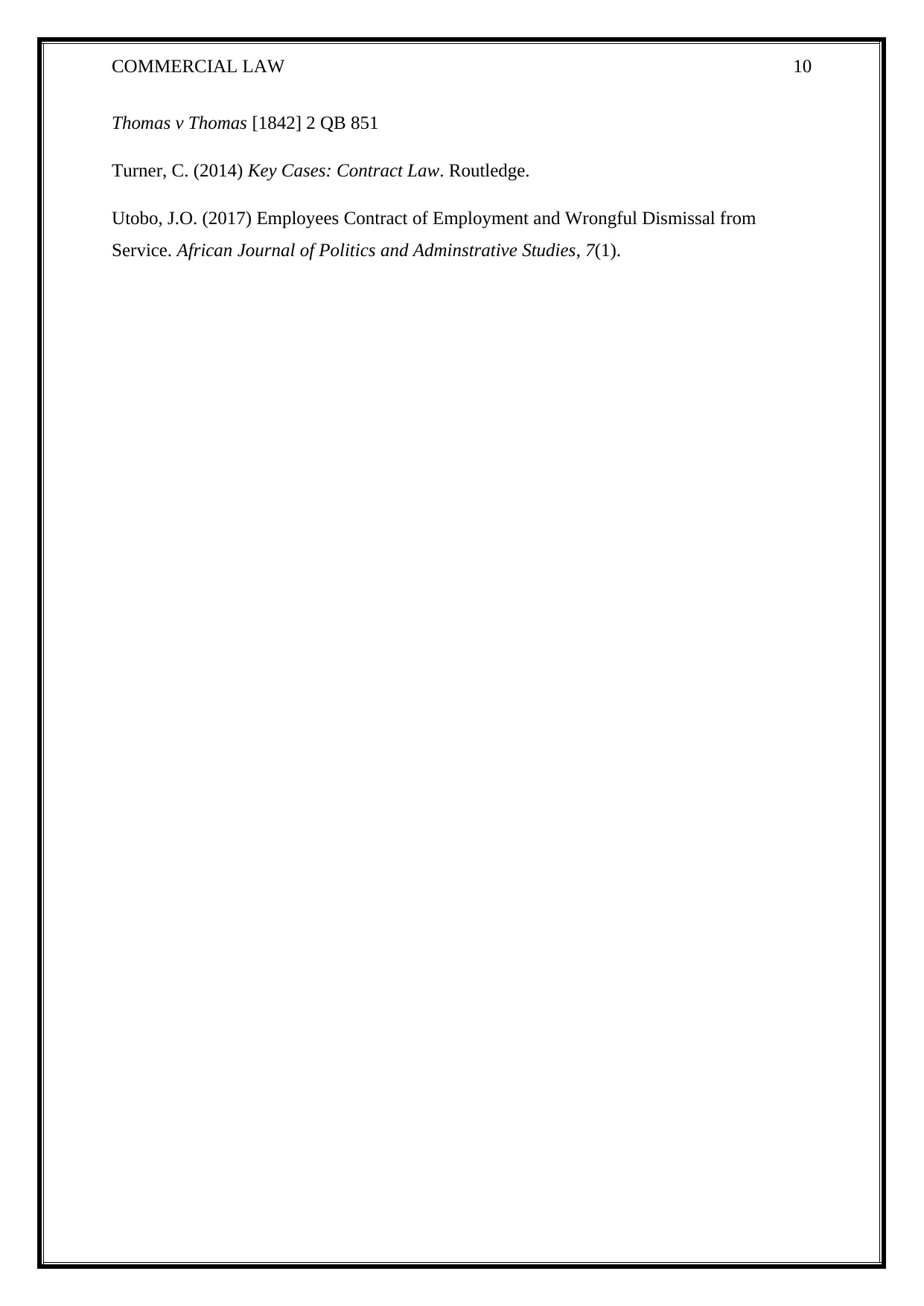
COMMERCIAL LAW 10
Thomas v Thomas [1842] 2 QB 851
Turner, C. (2014) Key Cases: Contract Law. Routledge.
Utobo, J.O. (2017) Employees Contract of Employment and Wrongful Dismissal from
Service. African Journal of Politics and Adminstrative Studies, 7(1).
Thomas v Thomas [1842] 2 QB 851
Turner, C. (2014) Key Cases: Contract Law. Routledge.
Utobo, J.O. (2017) Employees Contract of Employment and Wrongful Dismissal from
Service. African Journal of Politics and Adminstrative Studies, 7(1).
1 out of 11
Related Documents
Your All-in-One AI-Powered Toolkit for Academic Success.
+13062052269
info@desklib.com
Available 24*7 on WhatsApp / Email
![[object Object]](/_next/static/media/star-bottom.7253800d.svg)
Unlock your academic potential
Copyright © 2020–2026 A2Z Services. All Rights Reserved. Developed and managed by ZUCOL.



